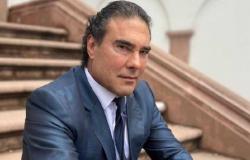
The Colombian publishing house Caballito de Acero is one of the few literary projects that only publishes sports fiction in Spanish. The only one, perhaps. It was born seven years ago, in 2017, when Luis Alejandro Díaz, its founder, owner and editor, returned to Colombia after completing a doctorate in philology in Spain and an official course to be a soccer coach. He interned as a professional coach at Club Esportiu Júpiter, a third division team in Barcelona, while writing his doctoral thesis, titled Literature and soccer: other horizons of fiction in Spain and Latin America. “They are the two passions I have in life: sports and books, that’s why the publishing house was born,” says Díaz (Bogotá, 46 years old) in an interview with EL PAÍS. Today, Caballito de Acero has published more than 20 novel, short story and poetry titles, and was selected to participate in the Madrid Book Fair 2024, which has sport as its central theme. This year, for the first time in a long time, the Olympic Games in Paris, the Euro Cup in Germany and the Copa América in the United States coincide. The Caballito de Acero books will be available to readers thanks to the Talento program on board the Iberia airline, in the central area of the Paseo de Coches in El Retiro park, from June 10 to 16.
“Sport exposes human beings to the limits of their own identity in a matter of seconds,” says Díaz in Bogotá, before traveling to Madrid. “When an athlete is going to take a penalty or get into the ring or is about to give checkmate, he experiences in an instant all the sensations that a normal person can feel over many years of life.” In that immediate passage from anguish to ecstasy and from ecstasy to glory or failure is the material for a poet or a novelist. “That’s what I like to publish,” Díaz says. And he complements. “At Caballito de Acero we look for books that show the human condition around sport.” The stamp has tales of football, cycling and chess; boxing and athletics novels; or poems about the art of billiards, among many others. Díaz is sure that sport is a fundamental part of a human’s education. “It shows us a world of possibilities, of illusion. Nowadays nothing gives excitement, sport does, it is a bit of joy in a desolate world, that is why it is worth so much.”
Díaz brought love and energy to the project. He realized that in Colombia there was nothing like it. He says that when he enters a bookstore he likes to ask if there are specialized sections for newspapers and correspondence, crime novels and sports. “Sometimes there is a crime novel, almost never a correspondence and never a sport.” Steel Horse was a treat he gave himself. “I made the books that I would like to read.” He paraphrases Juan Rulfo when the Mexican said that he had written his books, because they were the ones that his library needed. “The publisher has the books that I would like to buy and have on my nightstand. The only criterion is literary quality, that they excite me as much as watching a game or a race.” With that logic, he published Six rounds, boxing stories written by Arthur Conan Doyle and Jack London; The Instrumentalina, a short novel about peasant women and bicycles, by the great Portuguese author Lídia Jorge, translated for the first time into Spanish; either The billiards playera book of poems by the Argentine Andrés Neuman: “The author portrays us those decisive moments in which the billiard player contemplates the solitude of the table, the light of the moment and the sound of the cloth through which the game rolls,” reads the review.
The most successful books of the publishing house, and those that have given it recognition in Colombia, have been those about soccer. Díaz published a few years ago I am a chicken, I am a lion, a book of 22 soccer stories, 11 written by authors who are fans of Millonarios and 11 of Independiente Santa Fe, the two main teams in Bogotá. In this risky bet, published in heads and tails format, some of the best contemporary writers in the capital participated. The book was disruptive because it brought together two eternal rivals. “The idea was to show that football can be lived in peace, in coexistence,” says Díaz. After that success, he published I am purslane, I am powerful, a book in the same format, but this time with fans of Atlético Nacional and Independiente Medellín, the two rivals of the capital of Antioquia. Now he dreams of doing the same, but with the great soccer classics of the Hispanic world: Boca Juniors and River Plate, in Argentina; America and Chivas, in Mexico, and why not Real Madrid and Barcelona, in Spain.
In contrast to those dreams, Díaz says he is tired of the fact that there is not enough money to maintain the publishing house. He knows that an independent literature project is not going to make him rich, but he would like it to at least stand on its own. “The financial part is very intermittent, a roller coaster. One fair goes well, and the other badly; “One novelty sells, the next does not,” he says in a story identical to that of many publishing projects in Latin America, which survive thanks to the non-returnable investments of their owners. “The book in Colombia is not fully consolidated as a commercial object, and sometimes one hesitates, because a lot of time and money is invested. “One does not enter this world convinced that it is a good business, but out of love for culture and art.”
Newsletter
The analysis of current events and the best stories from Colombia, every week in your mailbox
RECEIVE THE
Little Steel Horse is standing in a difficult place, in the middle of two worlds that seem to turn their backs on each other. “People who like books and literature see sports as something minor; and people who do a lot of sports see books as boring,” says Díaz, half jokingly, half seriously. His job, in the end, is to unite those two universes. “Sometimes we don’t realize it, but they are identical worlds. The athlete and the writer live by imagination. The editorial tries to demonstrate to the athlete that he can know his discipline better if he reads literature, and to the writer that sport is one of the great themes of life, like death, love or the relationship with the father. Eva Orúe, director of the Madrid Fair, agrees with this: “Sport is in the books because it is essential in our lives; and that is the reason why it inspires so much literature. “There is a notable tradition of sports storytelling and poetry,” she said in a press release.
After many years of study and hobby, Díaz is clear that an athlete can only reach the elite if he loves pain and beauty. “A cyclist on a mountain stage can lose an average of 9,000 calories; “A boxer, in a ten-minute professional fight, can lose between three and four kilos,” he says confidently, and adds: “If you lose 3 or 4 kilos in ten minutes, or 9,000 calories in five hours, you will die or die.” sick”. His reflection is simple and with his data it seems incontrovertible: “Elite athletes overcome the pain barrier, their head goes further, they are from another race, superior people. That drives me crazy, there is literature there.” The aesthetic beauty of sport is also fundamental, it is there all the time. “Seeing Iniesta make two tunnels, seeing Messi make a hat, that’s like painting, it should be in a museum. There cannot be anything more beautiful than the body at that level of perfection,” concludes Díaz.
When asked what he would put in an imaginary museum of the great works of sport, Díaz answers excitedly and without hesitation: “A loop of the Brazil vs. Italy match in the World Cup in Spain in 1982. That Brazil had Socrates, Zico , to Falcão, it was like having Miró, Dali and Leonardo on the same team. In the other, an Italy without any great talent. “Italy won 3-2, eliminated Brazil and became champion.” He says he would also put Erik the terrible Morales’ first fight against Manny Pacquiao; the double overtaking of the driver Mika Häkkinen, from McLaren, on Michael Schumacher, from Ferrari, in Formula 1; and cyclist Marco Pantani’s monumental climbs in the Tour de France. However, like all fans, he has an immovable favorite. “An athlete who has me crazy: the Slovakian Peter Sagan. He is from another planet, he is who I would have wanted to be: enjoying the bicycle every day, all my life, he is a poet, an artist.”
Díaz confesses that the happiest moments in these years at the head of Caballito de Acero have been when at a fair a child buys one of his books. “Even more than seeing an author happy with his book, which is a beautiful moment, when a child decides on his own to buy a copy of Caballito de Acero, my soul breaks with joy.” He dreams, in the long term, of his publishing company sponsoring a soccer team or a Formula 1 car, “that would be the pinnacle.” In the short term, he would love to be able to hire professionals who make a living from publishing sports literature.
Subscribe here to the EL PAÍS newsletter about Colombia and here to the channel on WhatsAppand receive all the information keys on current events in the country.





